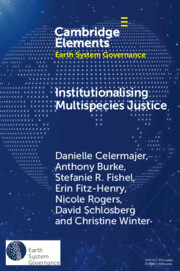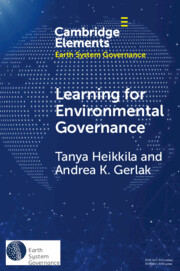Refine search
Actions for selected content:
58 results
Chapter 3 - Anti-SLAPP in Environmental Law
- from Part Two - Country Studies in Contexts
-
- Book:
- Turning Defenders into Defendants
- Published online:
- 18 November 2025
- Print publication:
- 31 January 2026, pp 94-120
-
- Chapter
- Export citation
Selective decentralization under the trend of centralization: reforms in China’s governmental power of environmental governance from 1973 to 2023
-
- Journal:
- Journal of Public Policy , First View
- Published online by Cambridge University Press:
- 19 November 2025, pp. 1-27
-
- Article
-
- You have access
- Open access
- HTML
- Export citation
Turning Defenders into Defendants
- The Use of Lawfare against Environmental Activists in Southeast Asia
-
- Published online:
- 18 November 2025
- Print publication:
- 31 January 2026
16 - Technologies in Environmental Governance
- from Part V - Governance by Technology
-
-
- Book:
- The Cambridge Handbook of the Governance of Technology
- Published online:
- 30 October 2025
- Print publication:
- 13 November 2025, pp 289-306
-
- Chapter
- Export citation
Government Supervision and Control Mechanisms for the Carbon Market in China: A Principal-Agent Perspective
-
- Journal:
- The China Quarterly , First View
- Published online by Cambridge University Press:
- 16 October 2025, pp. 1-19
-
- Article
- Export citation
The illusory promise of mediation-based governance
-
- Journal:
- Legal Studies , FirstView
- Published online by Cambridge University Press:
- 26 September 2025, pp. 1-25
-
- Article
-
- You have access
- Open access
- HTML
- Export citation
Tokenisation of forest carbon project: a blockchain-based approach for community engagement
-
- Journal:
- Journal of Tropical Ecology / Volume 41 / 2025
- Published online by Cambridge University Press:
- 22 August 2025, e23
-
- Article
-
- You have access
- Open access
- HTML
- Export citation
Negotiating the Quality of Property Rights: Heuristic Strategies for Better Environmental Outcomes in India
-
- Journal:
- Asian Journal of Law and Society , First View
- Published online by Cambridge University Press:
- 01 August 2025, pp. 1-19
-
- Article
- Export citation
Policy Experimentation Trapped in Tiao-driven Authoritarian Environmentalism: A Case Study of National Park Policy in China
-
- Journal:
- The China Quarterly / Volume 263 / September 2025
- Published online by Cambridge University Press:
- 30 July 2025, pp. 685-702
- Print publication:
- September 2025
-
- Article
- Export citation
Environmental Governance and Whistleblower Rewards: Balancing Prosocial Motivations with Monetary Incentives
-
- Journal:
- Law & Social Inquiry / Volume 50 / Issue 2 / May 2025
- Published online by Cambridge University Press:
- 14 March 2025, pp. 468-503
- Print publication:
- May 2025
-
- Article
-
- You have access
- Open access
- HTML
- Export citation

Institutionalising Multispecies Justice
-
- Published online:
- 29 January 2025
- Print publication:
- 27 February 2025
-
- Element
-
- You have access
- Open access
- HTML
- Export citation
Food Consumption, Eco-civilization and Environmental Authoritarianism in China
-
- Journal:
- The China Quarterly / Volume 261 / March 2025
- Published online by Cambridge University Press:
- 06 December 2024, pp. 57-72
- Print publication:
- March 2025
-
- Article
-
- You have access
- Open access
- HTML
- Export citation
Legal pluralism, ideology, and institutional change: the evolution of institutions for coastal resource governance in Ghana
-
- Journal:
- Journal of Institutional Economics / Volume 20 / 2024
- Published online by Cambridge University Press:
- 19 September 2024, e32
-
- Article
- Export citation
On the edges of extinction: Indigenous whaling governance, the 1977 “bowhead controversy” and its legacy
-
- Journal:
- Cambridge Prisms: Extinction / Volume 2 / 2024
- Published online by Cambridge University Press:
- 09 September 2024, e10
-
- Article
-
- You have access
- Open access
- HTML
- Export citation
Curbing Elite Capture or Enhancing Resources: Recentralizing Local Environmental Enforcement in China
-
- Journal:
- The China Quarterly / Volume 261 / March 2025
- Published online by Cambridge University Press:
- 03 June 2024, pp. 73-92
- Print publication:
- March 2025
-
- Article
-
- You have access
- Open access
- HTML
- Export citation

Learning for Environmental Governance
- Insights for a More Adaptive Future
-
- Published online:
- 22 April 2024
- Print publication:
- 16 May 2024
-
- Element
- Export citation
The Intersections of Public Rights and Private Rules: An Analysis of Human Rights in Forestry and Fisheries Certification Standards
-
- Journal:
- Transnational Environmental Law / Volume 13 / Issue 1 / March 2024
- Published online by Cambridge University Press:
- 11 March 2024, pp. 190-222
-
- Article
-
- You have access
- Open access
- HTML
- Export citation
Herbicide-resistance management: a common pool resource problem?
-
- Journal:
- Weed Science / Volume 72 / Issue 2 / March 2024
- Published online by Cambridge University Press:
- 20 February 2024, pp. 117-124
-
- Article
-
- You have access
- Open access
- HTML
- Export citation
Rights of Nature on the Island of Ireland: Origins, Drivers, and Implications for Future Rights of Nature Movements
-
- Journal:
- Transnational Environmental Law / Volume 13 / Issue 1 / March 2024
- Published online by Cambridge University Press:
- 18 January 2024, pp. 35-60
-
- Article
-
- You have access
- Open access
- HTML
- Export citation

Trade and the Environment
- Drivers and Effects of Environmental Provisions in Trade Agreements
-
- Published online:
- 07 December 2023
- Print publication:
- 21 December 2023
-
- Element
-
- You have access
- Open access
- HTML
- Export citation
